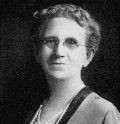Mr. Sulphuric acid is suffering from chronic alcoholism, his stomach is nearly ruined. The first thing in the morning he vomits water and mucus which is so sour that it sets his teeth on edge. He can’t keep water down at all unless mixed with some alcohol. He craves fresh fruit and brandy. His throat is raw and sensitive, and his mouth is full of ulcers. Why shouldn’t it be with that acid stomach? He has most excruciating pains across the stomach. He is subject to hemorrhages; bleeds black blood from almost anywhere. He feels worse in the open air, sits and weeps all day and is good for nothing. When he does do anything he hurries through it as though he couldn’t get it done quickly enough.
Mrs. Robinia has a dull, heavy, squeezing pain constantly after eating. She will eat only one meal a day because it causes such severe pain. Her food turns sour in her stomach soon after eating, everything she takes turns to acid, and like Mr. Sulphuric acid, her teeth are on edge when it comes up. Water taken the night before, returns in the morning green and sour. She is very low spirited, and weeps every day with the pain in her stomach.
Mrs. Iris versicolor is another who turns everything that goes into her stomach into acid, and when it comes up it feels as though it scalded the throat, mouth, fauces, tongue, in fact every place it touches. She has great burning in the stomach that she can hardly endured. She is low spirited and discouraged.
That pale emaciated woman with the suffering expression on her face, who is weeping by the piano, is Mrs. Kreosotum. Music is quite likely to call forth her tears. She is a great sufferer, and has emaciated rapidly since coming here; she longs for death. She has great thirst, drinks greedily and then vomits it. Sensation of a lump of ice in the stomach, or a feeling of fullness, as though she had eaten too much. She has pressing, gnawing, ulcerating pains in the stomach with vomiting of blood.
Mr. Mercurius corrosivus has a sluggish mind. he will stare straight at the person talking to him, and not understand a word that is said. He has a violent unquenchable thirst for large quantities of cold water. Hot food is repugnant to him, he wants cold food. His stomach is distended and sore; he can’t bear to have it touched even by the clothing. There are burning, darting, cramping pains in the stomach; the vomiting is spasmodic, incessant and painful. He vomits bile, stringy mucus, blood.
Do you see that woman over there talking to Mr. Bismuth? It is Mrs. LAchesis, she is noted for being one of the most loquacious women in the world. She has a vivid imagination, talks rapidly, uses good language and jumps from one subject to another with surprising rapidity. Mr. Bismuth is fond of company, but he wants to do the talking himself. If you watch them you will see him walk off and leave her in a few minutes. Then she will find some one else to talk to, for she must talk.
Do you notice her red cheek? If she turns the other side of her face this way you’ll see how pale she is, for she is a sufferer. Sometimes she is quiet and sorrowful, then she dislikes company, and doesn’t want to talk. She has a cancer in the stomach with painless gnawing pressure which is better after eating, but returns as soon as the stomach is empty again. The pit of her stomach is sore to touch, and she has dull, stinging, stitching pains. She can’t bear to have her clothes touch her, either about the throat or waist, so she wears an empire gown cut decollete.
Last but not the least is our old friend, Mr. Sulphur. He is the same dirty “ragged philosopher” that we have always known. He has the same empty, gone, faint feeling in the stomach at 11 a.m., and the same feeling of weight about which he used to complain. He is too lazy to rouse himself up, too unhappy to live, and he dreads a bath just as much as he did when a child. Probably he thinks food is made for ornament and water is made for drink, for he eats little and drinks much.

